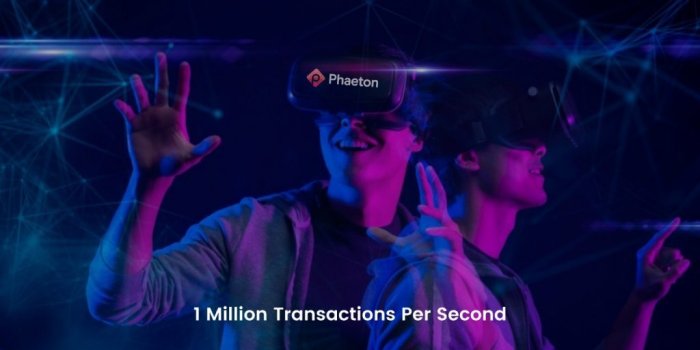K
Kathleen Martin
Guest
In November 2021, Grayscale published a report titled, “The Metaverse, Web 3.0 Virtual Cloud Economies.” Written by Grayscale’s research analyst Matt Maximo and head of research, David Grider, the report focused on metaverse education, explaining the possibilities presented by this rising phenomenon. Grider and Maximo described the Metaverse as having a USD $1 trillion annual revenue potential in the report.
Metaverse is a hypothesized futuristic alternate universe. It comprises a virtual world presented on a virtual reality network, augmented reality, and artificial intelligence on the internet. As of the present, no one knows precisely what the Metaverse would look like. Still, there is a consistent marketing hype wrapped around the concept of Metaverse. In its vision, Facebook projects a future where its users would have access to digital wardrobe to swipe through. Business-wise, this sounds like Facebook projects to make money by selling virtual clothes. But is this what Metaverse means?
Metaverse is not a reference to a particular technology but rather a reference to capture the totality of our experience as we interact with technology. The primary defining technology of the Metaverse will be virtual reality. A persistent characteristic virtual world that exists continuously even when users are not playing and augmented reality. This technology merges aspects of physical and digital worlds to create pseudo realities. Unlike VR and AR, the virtual worlds of the Metaverse will be accessible through smart devices like smartphones, PCs, and game consoles.
There is more. The Metaverse also represents a virtual economy where people can produce and trade goods across interoperable platforms. It interprets that users may be able to take virtual items across platforms owned by different organizations. The current use of avatars, virtual identities and inventories are tied to host platforms. In the Metaverse, there may exist a possibility to transcend this limitation and carry your virtual assets with you to any platform where they may be used. The applications of Metaverse are not limited and can be viewed as a digital extension of real life.
The Grayscale report stated that ‘our social lives and gaming are converging and creating large, fast-growing virtual goods consumer economy. It is estimated that revenue from virtual gaming worlds could grow from ~$180 billion in 2020 to ~$400 billion in 2025.‘ The report states that cryptocurrency and decentralized finance like lending and staking, decentralized governance, non-fungible tokens, and decentralized cloud storage will create a new online experience. It will rapidly attract new users such as Decentraland, a platform where people interact, govern, and earn tokens and real-life benefits for time spent online.
The role of blockchains in the Metaverse will be integral to creating users’ acceptance and reliability on the Metaverse. The argument for the energy consumption of any technology is always associative. Phaeton is already developing energy-efficient algorithms and is powered entirely on renewable energy. The fight for the energy consumption of the Metaverse may be non-existent as the carbon footprint of this technology becomes negligible with the shift to energy efficiency and renewable energy. Blockchains like Phaeton are already building the infrastructure that will host the future of the Metaverse.
Continue reading: https://cryptomode.com/into-the-metaverse-the-blockchain-that-will-host-the-future/
Metaverse is a hypothesized futuristic alternate universe. It comprises a virtual world presented on a virtual reality network, augmented reality, and artificial intelligence on the internet. As of the present, no one knows precisely what the Metaverse would look like. Still, there is a consistent marketing hype wrapped around the concept of Metaverse. In its vision, Facebook projects a future where its users would have access to digital wardrobe to swipe through. Business-wise, this sounds like Facebook projects to make money by selling virtual clothes. But is this what Metaverse means?
Metaverse is not a reference to a particular technology but rather a reference to capture the totality of our experience as we interact with technology. The primary defining technology of the Metaverse will be virtual reality. A persistent characteristic virtual world that exists continuously even when users are not playing and augmented reality. This technology merges aspects of physical and digital worlds to create pseudo realities. Unlike VR and AR, the virtual worlds of the Metaverse will be accessible through smart devices like smartphones, PCs, and game consoles.
There is more. The Metaverse also represents a virtual economy where people can produce and trade goods across interoperable platforms. It interprets that users may be able to take virtual items across platforms owned by different organizations. The current use of avatars, virtual identities and inventories are tied to host platforms. In the Metaverse, there may exist a possibility to transcend this limitation and carry your virtual assets with you to any platform where they may be used. The applications of Metaverse are not limited and can be viewed as a digital extension of real life.
The Grayscale report stated that ‘our social lives and gaming are converging and creating large, fast-growing virtual goods consumer economy. It is estimated that revenue from virtual gaming worlds could grow from ~$180 billion in 2020 to ~$400 billion in 2025.‘ The report states that cryptocurrency and decentralized finance like lending and staking, decentralized governance, non-fungible tokens, and decentralized cloud storage will create a new online experience. It will rapidly attract new users such as Decentraland, a platform where people interact, govern, and earn tokens and real-life benefits for time spent online.
The role of blockchains in the Metaverse will be integral to creating users’ acceptance and reliability on the Metaverse. The argument for the energy consumption of any technology is always associative. Phaeton is already developing energy-efficient algorithms and is powered entirely on renewable energy. The fight for the energy consumption of the Metaverse may be non-existent as the carbon footprint of this technology becomes negligible with the shift to energy efficiency and renewable energy. Blockchains like Phaeton are already building the infrastructure that will host the future of the Metaverse.
Continue reading: https://cryptomode.com/into-the-metaverse-the-blockchain-that-will-host-the-future/

